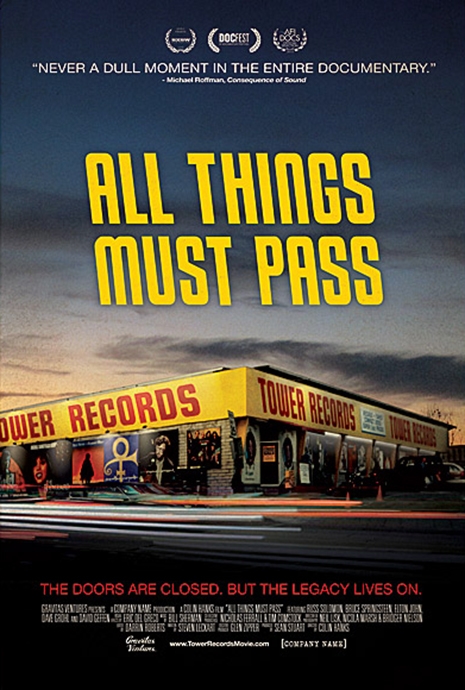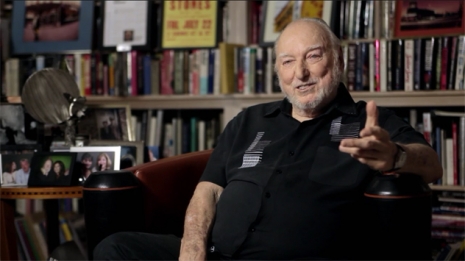
I just finished watching Colin Hanks’ impressive documentary on the rise and fall of Tower Records, titled All Things Must Pass.
While I’d recommend the film to anyone who was ever a frequent Tower shopper, I’d say it’s a must-see for anyone who has ever worked music retail, particularly those who worked during the late ‘90s to early ‘2000s, which saw the decline of physical media sales.
The film centers on Russ Solomon who founded Tower Records in Sacramento, California in 1960, and traces the path he took in building the Tower brand from a single “supermarket of music” to a worldwide mega-chain. The documentary does a fair job at assessing the “perfect storm” that caused the ultimate collapse of the chain, culminating with the closing of their last company-owned store in 2006.

Tower Records head-honcho, Russ Solomon
Interviews with David Geffen, Elton John, Bruce Springsteen, and the obligatory Dave Grohl documentary appearance (is there some rule that says Grohl has to appear in EVERY music-related documentary?) give some insight to Tower’s cultural significance, rounding out the insider interviews with Tower’s top brass who detail the company’s rise and fall.
While the film offers a poignant homage to the Tower concept, brand and its larger-than-life captain, Russ Solomon, where it really shines is in its deconstruction of how the music industry as a whole dropped the ball in the late ‘90s. It was interesting to see Geffen offer his theories on how the industry screwed the pooch, leading, along with over-expansion, to Tower’s eventual demise.
In the ‘90s I worked at a regional chain record store that modeled itself after Tower and I watched a lot of this stuff go down first-hand. Though the industry likes to point to the advent of Napster as the magic bullet that killed retail music, it was, in many ways, their own greed and shortsightedness that worked in conjunction with “illegal” downloads to kill retail. All Things Must Pass highlights the fact that the industry intentionally killed the single in order to force consumers into paying fifteen dollars for a full-length CD. I worked during the “golden age” of the CD single and “cassingle,” and those were beloved by a die-hard customer base. When the singles disappeared, we lost many customers to GAS STATIONS because the gas stations sold pirated “mixtapes” that contained all the songs our customers wanted without having to buy a hundred bucks worth of other songs that they didn’t want. Soon thereafter, these very same customers would be downloading those very same songs.
I can remember working at the shop in 1993 when Garth Brooks became the voice of major labels looking to crush the used CD market. Brooks had pledged to withhold his latest release from any record store that sold used merchandise. He eventually backed down and WEA, UNI and Sony Music Distribution were investigated by the Federal Trade Commission and were the target of several antitrust lawsuits related to their policies against stores that sold used CDs. The labels had attempted to withhold co-op advertising dollars from shops that sold used CDs, asserting that those sales were unfairly cutting into their profits.
I remember when one major electronics chain started its nation-wide expansion and its strategy was to open shops near existing record stores, and to sell all of their CDs for ten dollars each—and to stock damn-near everything. In many cases, they were selling CDs below actual cost as a loss-leader to get people in the doors to buy washing machines and refrigerators. But what they were also doing was destroying their competition by offering CDs at a price that could not be matched. When they effectively ran the other record stores out of business, they stopped stocking all of the deep-catalog titles and only reordered “the hits.” And then the prices magically went up—a shrewd business practice that destroyed several mid-sized music retail chains and made it impossible for music fans in many markets to buy anything, outside of the mainstream, locally… pushing them to search for music—ahem—online.
The owner of the Tower-wannabe shop I worked at in the ‘90s saw the writing on the wall and sold his small chain just a few years before Tower went under. After I stopped working there in the mid-‘90s, I owned my own record shop for five years which focused primarily on punk and indie music. Since closing that shop, I have worked in a small “mom and pop” type record store which has remained financially solvent for over 30 years and does quite well today, especially thanks to the resurgence of interest in vinyl. It’s a store that caters to serious music fans and doesn’t attempt to be “all things to all people,” which may have been part of Tower’s undoing—that’s a lot of overhead to maintain in an age of declining physical sales. I believe that small shops can survive and thrive in today’s market, and will for decades to come. Will there ever be another music retail phenomenon like Tower Records in its heyday? Definitely not. We are culturally past that now, and that’s OK. And as hypocritical as it may seem coming from someone who has worked most of his entire life in music retail, I feel a certain amount of satisfaction in watching the music industry’s death throes. As sad a tale as the Tower “rise and fall” story is, ultimately, in All Things Must Pass, it’s also the tale of the music industry imploding due to its own greed—and that part is actually pretty fun.
All Things Must Pass can be streamed HERE.
This is the trailer:
Previously on Dangerous Minds:
Fantastic footage documenting the Tower Records shopping experience of 1971
John Lennon’s Tower Records commercial, 1973